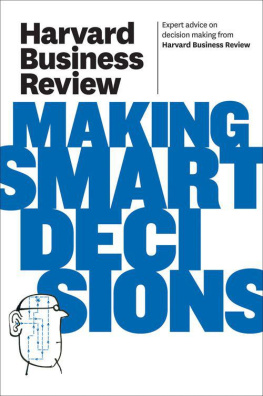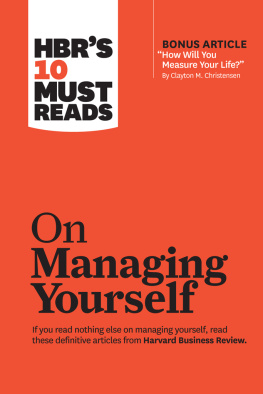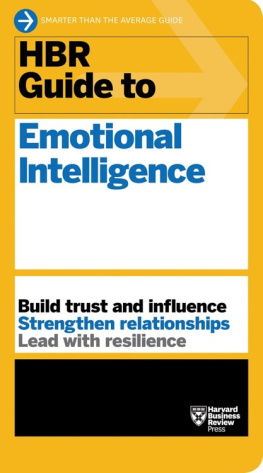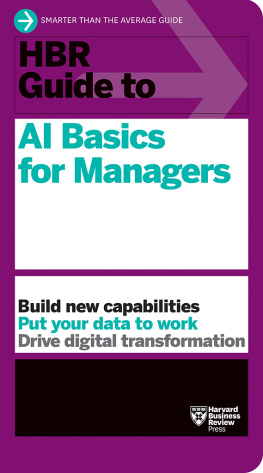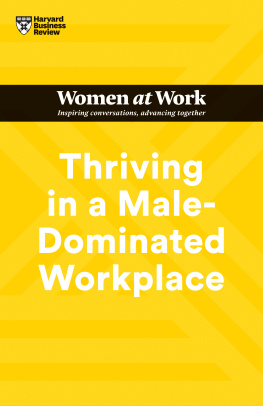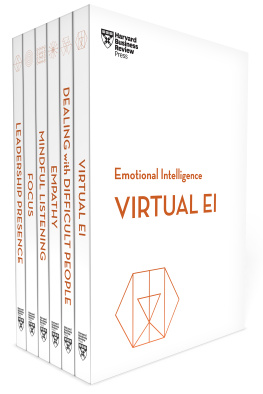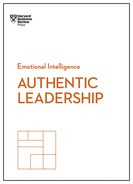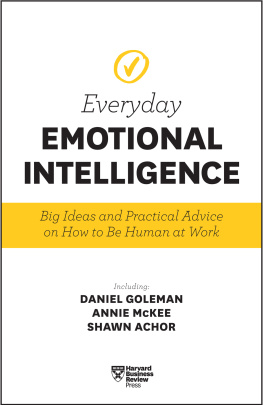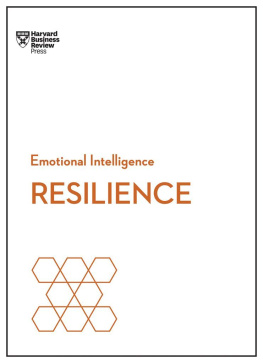HBR Press Quantity Sales Discounts
Harvard Business Review Press titles are available at significant quantity discounts when purchased in bulk for client gifts, sales promotions, and premiums. Special editions, including books with corporate logos, customized covers, and letters from the company or CEO printed in the front matter, as well as excerpts of existing books, can also be created in large quantities for special needs.
For details and discount information for both print and ebook formats, contact .
Copyright 2019 Harvard Business School Publishing Corporation
All rights reserved
Printed in the United States of America
10 9 8 7 6 5 4 3 2 1
No part of this publication may be reproduced, stored in or introduced into a retrieval system, or transmitted, in any form, or by any means (electronic, mechanical, photocopying, recording, or otherwise), without the prior permission of the publisher. Requests for permission should be directed to , or mailed to Permissions, Harvard Business School Publishing, 60 Harvard Way, Boston, Massachusetts 02163.
The web addresses referenced in this book were live and correct at the time of the books publication but may be subject to change.
Library of Congress Cataloging-in-Publication Data
Title: Confidence.
Other titles: Confidence (2019) | HBR emotional intelligence series.
Description: Boston, Massachusetts : Harvard Business Review Press, [2019] | Series: HBR emotional intelligence series | Includes index.
Identifiers: LCCN 2018044756 | ISBN 9781633696648 (pbk.)
Subjects: LCSH: Self-confidence. | Success in businessPsychological aspects. | Attitude (Psychology) | Emotional intelligence.
Classification: LCC BF575.S39 C66 2019 | DDC 155.2dc23
LC record available at https://lccn.loc.gov/2018044756
ISBN: 978-1-63369-664-8
eISBN: 978-1-63369-665-5
The paper used in this publication meets the requirements of the American National Standard for Permanence of Paper for Publications and Documents in Libraries and Archives Z39.48-1992.
Contents
Become more self-assured at work.
By Amy Gallo
From self-defeating assumptions to defensiveness to arrogance.
By Rosabeth Moss Kanter
Change your frame of mind when youre feeling inadequate.
By Andy Molinsky
How rituals can help you manage your anxiety.
An interview with Daniel McGinn by Sarah Green Carmichael
Experience can be deceiving, especially to novices.
By Carmen Sanchez and David Dunning
Develop new parts of yourself through performance.
By Cathy Salit
What your body language signals to your audience.
By Kasia Wezowski
Be more authentic and inspire confidence in others.
By Amy Jen Su
Build team resilience to recover from setbacks.
By Rosabeth Moss Kanter
Gather your emotional courage in the face of risk.
By Peter Bregman
Address their inner critic head-on.
By Tara Sophia Mohr
Female leaders face an unfair standard.
By Margarita Mayo
Dont confuse confidence with competence.
By Tomas Chamorro-Premuzic
Self-criticism can be motivating.
By Tomas Chamorro-Premuzic
Confidence
HBR EMOTIONAL INTELLIGENCE SERIES
1
How to Build Confidence
By Amy Gallo
Very few people succeed in business without a degree of confidence. Yet everyone, from young people in their first real jobs to seasoned leaders in the upper ranks of organizations, have momentsor days, months, or even yearswhen they are unsure of their ability to tackle challenges. No one is immune to these bouts of insecurity at work, but they dont have to hold you back.
What the experts say
Confidence equals security equals positive emotion equals better performance, says Tony Schwartz, the president and CEO of The Energy Project and the author of Be Excellent at Anything: The Four Keys to Transforming the Way We Work and Live. And yet he concedes that insecurity plagues consciously or subconsciously every human being Ive met. Over-coming this self-doubt starts with honestly assessing your abilities (and your shortcomings) and then getting comfortable enough to capitalize on (and correct) them, adds Deborah H. Gruenfeld, the Moghadam Family Professor of Leadership and Organizational Behavior and Codirector of the Executive Program for Women Leaders at Stanford Graduate School of Business. Heres how to do that and get into the virtuous cycle that Schwartz describes.
Prepare
Your piano teacher was right: Practice does make perfect. The best way to build confidence in a given area is to invest energy in it and work hard at it, says Schwartz. Many people give up when they think theyre not good at a particular job or task, assuming the exertion is fruitless. But Schwartz argues that deliberate practice will almost always trump natural aptitude. If you are unsure about your ability to do somethingspeak in front of a large audience, negotiate with a tough customerstart by trying out the skills in a safe setting. Practice can be very useful and is highly recommended because, in addition to building confidence, it also tends to improve quality. Actually deliver the big presentation more than once before the due date. Do a dry run before opening a new store, says Gruenfeld. Even people who are confident in their abilities can become more so with better preparation.
Get out of your own way
Confident people arent only willing to practice, theyre also willing to acknowledge that they dontand cantknow everything. Its better to know when you need help than not, says Gruenfeld. A certain degree of confidencespecifically, confidence in your ability to learnis required to be willing to admit that you need guidance or support.
On the flip side, dont let modesty hold you back. People often get too wrapped up in what others will think to focus on what they have to offer, says Katie Orenstein, founder and director of The OpEd Project, a nonprofit that empowers women to influence public policy by submitting opinion pieces to newspapers. When you realize your value to others, confidence is no longer about self-promotion, she explains. In fact, confidence is no longer the right word. Its about purpose. Instead of agonizing about what others might think of you or your work, concentrate on the unique perspective you bring.


